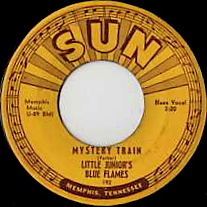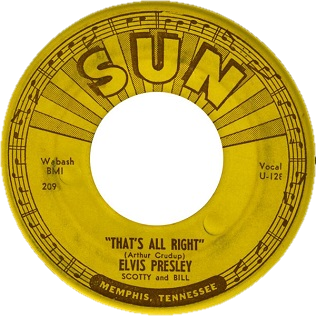Related Research Articles

"She Loves You" is a song by the English rock band the Beatles, written by John Lennon and Paul McCartney and released as a single in the United Kingdom on 23 August 1963. The single set and surpassed several sales records in the United Kingdom charts, and set a record in the United States as one of the five Beatles songs that held the top five positions in the charts simultaneously, on 4 April 1964. It remains the band's best-selling single in the UK and was the top-selling single of the 1960s there by any artist.

"Hound Dog" is a twelve-bar blues song written by Jerry Leiber and Mike Stoller. Recorded originally by Big Mama Thornton on August 13, 1952, in Los Angeles and released by Peacock Records in late February 1953, "Hound Dog" was Thornton's only hit record, selling over 500,000 copies, spending 14 weeks in the R&B charts, including seven weeks at number one. Thornton's recording of "Hound Dog" is listed as one of the Rock and Roll Hall of Fame's "500 Songs That Shaped Rock and Roll", ranked at 318 in the 2021 iteration of Rolling Stone's 500 Greatest Songs of All Time and was inducted into the Grammy Hall of Fame in February 2013.

The Sun Sessions is a compilation album by American singer Elvis Presley, issued by RCA Records in 1976. The album contains Presley's earliest commercial recordings, made in Memphis, Tennessee for Sun Records in 1954 and 1955. RCA issued the album in the UK in 1975 under the title The Sun Collection. The album features liner notes by Roy Carr of the New Musical Express. The Sun Sessions features most of the tracks Elvis recorded for Sun Records and produced by Sam Phillips, the head of Sun Studios. The Sun Sessions reached number two on the Billboard Country Albums and number 1 on the Cashbox Country Albums charts.

"Mystery Train" is a song written and recorded by American blues musician Junior Parker in 1953. Originally performed in the style of a Memphis blues or rhythm and blues tune, it was inspired by earlier songs and later became a popular rockabilly song, as first covered by Elvis Presley, then numerous others.

"That's All Right" is a song written and originally performed by the American blues singer Arthur Crudup and recorded in 1946. It was rereleased in early March 1949 by RCA Victor under the title "That's All Right, Mama", which was issued as RCA's first rhythm and blues record on its new 45 rpm single format.
"Blue Moon of Kentucky" is a waltz written in 1945 by bluegrass musician Bill Monroe and recorded by his band, the Blue Grass Boys. Some think the origins may trace back to "Roll Along, Kentucky Moon", a similar waltz recorded 20 years prior by Jimmie Rodgers. The song has since been recorded by many artists, including Elvis Presley, Paul McCartney. The song is the official bluegrass song of Kentucky.
"Don't Be Cruel" is a song that was recorded by Elvis Presley and written by Otis Blackwell in 1956. It was inducted into the Grammy Hall of Fame in 2002. In 2004, it was listed #197 in Rolling Stone's list of 500 Greatest Songs of All Time.

"Are You Lonesome Tonight?" is a song written by Roy Turk and Lou Handman in 1926. It was recorded several times in 1927—first by Charles Hart, with successful versions by Vaughn De Leath, Henry Burr, and the duet of Jerry Macy and John Ryan. In 1950, the Blue Barron Orchestra version reached the top twenty on the Billboard's Pop Singles chart.
"Have I Told You Lately That I Love You?" is a popular song written by Scotty Wiseman for the 1944 musical film, Sing, Neighbor, Sing and performed by Lulu Belle and Scotty. It was their greatest hit and one of the first country music songs to attract major attention in the pop music field. Although the song was featured in the movie, it was not released by Lulu Belle and Scotty until 1947. The first released version of this song was by Gene Autry in 1945.

Elvis is the second studio album by American rock and roll singer Elvis Presley, released by RCA Victor on October 19, 1956 in mono. Recording sessions took place on September 1, September 2, and September 3 at Radio Recorders in Hollywood, with one track left over from the sessions for Presley's debut album at the RCA Victor recording studios on January 30 in New York. It spent four weeks at #1 on the Billboard Top Pop Albums chart that year, making Presley the first recording artist to have both albums go straight to number one in the same year. It would go on to spend 5 weeks at #1 in total. It was certified Gold on February 17, 1960, and Platinum on August 10, 2011, by the Recording Industry Association of America.

"Good Rocking Tonight" is a jump blues song originally released in 1947 by its writer, Roy Brown and was covered by many recording artists. The song includes the memorable refrain, "Well I heard the news, there's good rocking tonight!" The song anticipated elements of rock and roll music.

"I Forgot to Remember to Forget" is a 1955 rockabilly and country song, first recorded by Elvis Presley and written by Stan Kesler and Charlie Feathers. It was Elvis' first no. 1 record nationally. The single was the fifth and final single released on Sun Records before Elvis moved to RCA Records.
"Release Me", is a popular song written by Eddie "Piano" Miller and Robert Yount in 1949. Four years later it was recorded by Jimmy Heap & the Melody Masters, and with even better success by Patti Page (1954), Ray Price (1954), and Kitty Wells (1954). Jivin' Gene [Bourgeois] & the Jokers recorded the tune in 1960, and that version served as an inspiration for Little Esther Phillips, who reached number one on the R&B chart and number eight on the pop chart with her big-selling cover. The Everly Brothers followed in 1963, along with Lucille Starr including a translation in French (1964), Jerry Wallace (1966), Dean Martin (1967), Engelbert Humperdinck (1967) who was number one on the UK Singles Chart and many others in the years after such as Jewels Renauld (2022).
Jailhouse Rock is an EP by American singer Elvis Presley, featuring songs from the movie of the same name. It was released by RCA Victor, with catalogue EPA 4114, on October 30, 1957. Recording sessions took place at Radio Recorders in Hollywood on April 30 and May 3, 1957, with an additional session at the Metro-Goldwyn-Mayer Soundstage in Hollywood on May 9 for "Don't Leave Me Now". It peaked at #1 on the newly inaugurated Billboard EP chart where it remained at #1 for 28 weeks. The EP album was the best selling EP album of 1958 according to Billboard.
"Don't Forbid Me" is a popular song by Charles Singleton. Among Singleton's huge number of compositions was "Tryin' to Get to You", which had previously been recorded by Elvis Presley at Sun Records. In 1957, "Don't Forbid Me" was a number 1 hit for Pat Boone, and also peaked at number 10 on the Most Played R&B in Juke Boxes chart.
"Baby Let's Play House" is a song written and originally recorded by Arthur Gunter in 1954 on the Excello Records label, and covered by Elvis Presley the following year on Sun Records. A line from the song was borrowed by John Lennon for his Beatles song "Run for Your Life", released on Rubber Soul in 1965.

"You'll Be Gone" is a song recorded by Elvis Presley and published by Elvis Presley Music and released in 1965 on the Girl Happy soundtrack album and as a 45 single. The song was recorded in 1962 and was one of very few which Presley was involved in writing; his co-writers were his bodyguard Red West and Charlie Hodge. The other song that Elvis Presley composed was "That's Someone You Never Forget" in 1961 with Red West, which was on the Pot Luck LP released in 1962. The song was recorded on Sunday, March 18, 1962, at RCA Studio B in Nashville, Tennessee.

Clambake is the sixteenth soundtrack album by American singer and musician Elvis Presley, released by RCA Victor in mono and stereo, LPM/LSP 3893, in October 1967. It is the soundtrack to the 1967 film of the same name starring Presley. He entered RCA Studio B in Nashville, Tennessee on February 21, 1967, for recording sessions for his twenty-fifth film. Supplemental material sessions took place on September 10 and 11, 1967. It peaked at number 40 on the Billboard 200.
"I'll Never Fall in Love Again" is a song written by Lonnie Donegan and Jimmy Currie, and first released by Donegan as a single in 1962.
References
- ↑ Guralnick, Peter (1995). Last Train to Memphis. Abacus. pp. 132–133. ISBN 0-349-10651-7.
- ↑ Whitburn, Joel (1973). Top Pop Records 1940–1955. Record Research.
- 1 2 DeWitt, Howard A. (1993). Elvis, the Sun Years: The Story of Elvis Presley in the Fifties. Popular Culture. p. 164. ISBN 9781560750208.
- ↑ Stanley, Bob (13 September 2013). Yeah Yeah Yeah: The Story of Modern Pop. Faber & Faber. p. 40. ISBN 978-0-571-28198-5.
- ↑ Tosches, Nick (1992). Living High in the Dirty Business of Dreams. New York: Dell Publishing. p. 581. ISBN 0-440-21412-2.
- ↑ Greene, Andy. "You Can Now Get Your Hands on a Beatles Setlist — If You Have $250,000 to Spare". Rolling Stone. Retrieved 17 October 2022.
- ↑ "Scared Stiff (1953)". IMDb.com. Retrieved May 4, 2021.
- ↑ "The Adventures of Priscilla, Queen of the Desert (1994)". IMDb.com. Retrieved May 4, 2021.